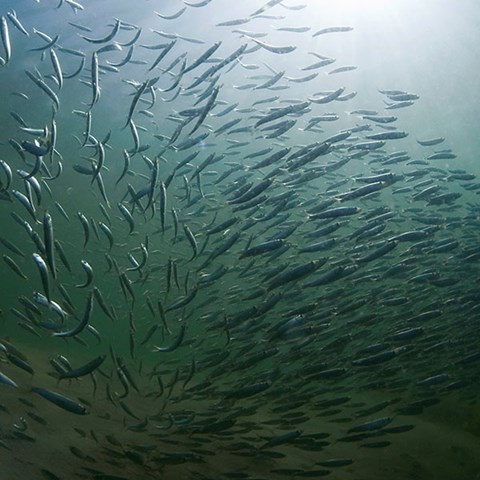Contact
Massimiliano Cardinale, Researcher
Department of Aquatic Resources, Institute of Marine Research, SLU
massimiliano.cardinale@slu.se, +46 10 478 40 14

Small fish stocks are more vulnerable than current management practices often acknowledge. A new study shows that when fish populations shrink, their ability to recover can decrease, leading to risks of overfishing, longer recovery times, and, in the worst cases, extinction – particularly for species like herring and sprat.
Modern fisheries management relies on the assumption that per capita productivity of fish stocks increases when the stock declines. In other words, the number of young fish produced per female is expected to increase when the number of females decreases because they are assumed to face less competition.
- However, both theory and empirical studies have shown that when a fish stock becomes too small, it can actually have the opposite effect – productivity decreases instead of increasing. This can happen, for example, because the fish have difficulty finding each other to spawn or because they become more vulnerable to predators, says Massimiliano Cardinale, researcher at the Department of Aquatic Resources at SLU.
This phenomenon is referred to as the Allee effect or depensation.
Together with colleagues from Denmark and Finland, Massimiliano Cardinale analyzed 81 fish stocks in the Northeast Atlantic to investigate what happens when this effect is not accounted for in fisheries management. The consequences are evaluated in terms of stock rebuilding time, probability of extinction, and management reference points. The study was recently published in the scientific journal Fish and Fisheries.
The paper shows that when depensatory effects are present but ignored, the assumption of increasing productivity at low biomass will generally result in over-optimistic perceptions of stock status at biomass especially for pelagic stocks like herring and sprat. The risk of extinction also increases if depensation is not accounted for as well as the time necessary for a stock to rebuild from low level of biomass.
- These results indicate that ignoring depensation, as currently done in all stock assessments of the Northeast Atlantic, could lead to unsustainable harvesting of marine living resources around the world, says Massimiliano Cardinale.
Read the full article: Rebuilding and Reference Points Under Compensatory and Depensatory Recruitment: A Meta-Analysis of Northeast Atlantic Fish Stocks
Massimiliano Cardinale, Researcher
Department of Aquatic Resources, Institute of Marine Research, SLU
massimiliano.cardinale@slu.se, +46 10 478 40 14